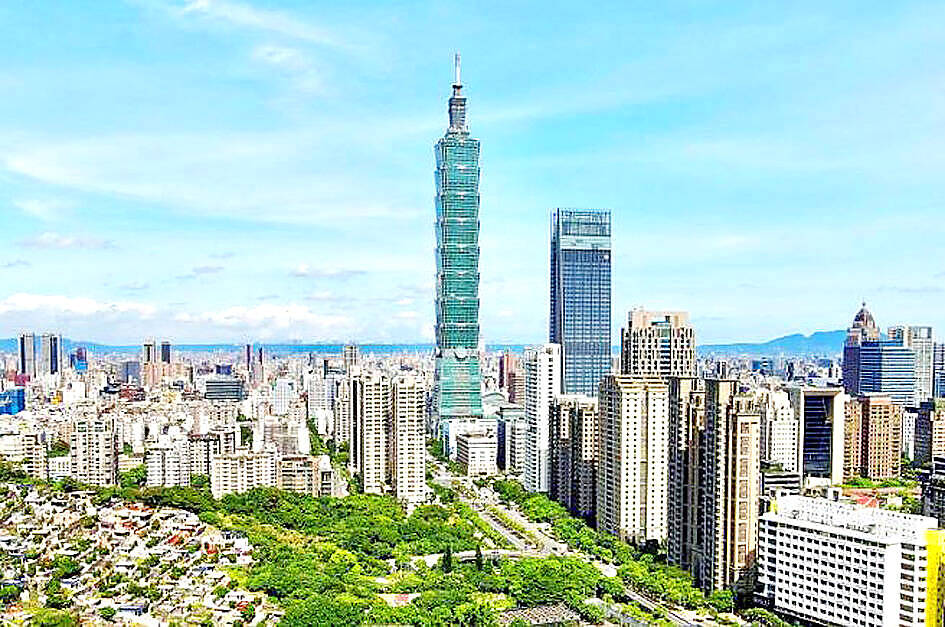Taiwan has risen two spots to sixth place out of 69 major economies in the latest World Competitiveness Ranking report published by the Switzerland-based International Institute for Management Development (IMD).
Taiwan also retained its position as the world’s most competitive economy among economies with populations of more than 20 million for the fifth consecutive year, the annual report released yesterday showed.
The index is based on four factors: economic performance, government efficiency, business efficiency and infrastructure — each of which include five subfactors based on different criteria.

Photo: AFP
Taiwan’s overall improvement in the rankings was attributed to a significant rise in the economic performance category, in which it advanced 16 places to 10th.
It remained strong in the other three categories, moving up two spots to fourth in business efficiency, and remaining eighth in government efficiency and 10th in infrastructure.
Taiwan’s rise in the economic performance category was largely the result of its advancement in the “domestic economy” subfactor, in which it surged from 13th to fourth.
That in turn was driven by indicators such as real GDP growth per capita, in which it rose 28 positions to fourth, reaching 4.68 percent.
In the international trade subfactor, Taiwan climbed from 48th to 30th, bolstered by growth in goods exports (ranked eighth, up 9.72 percent) and services exports (28th, up 8.95 percent).
The report also cited challenges Taiwan would face this year, which IMD said were provided by the National Development Council.
These include the need to “deepen international cooperation to enhance strategic positioning in the global value chain,” “diversify export markets ... to strengthen economic resilience” and “integrate AI [artificial intelligence] with industries to enhance productivity and competitiveness.”
The council said the government would continue using the IMD rankings as a reference for policy reform, particularly in the face of global uncertainties such as Washington’s new tariff policies.

Right-wing political scientist Laura Fernandez on Sunday won Costa Rica’s presidential election by a landslide, after promising to crack down on rising violence linked to the cocaine trade. Fernandez’s nearest rival, economist Alvaro Ramos, conceded defeat as results showed the ruling party far exceeding the threshold of 40 percent needed to avoid a runoff. With 94 percent of polling stations counted, the political heir of outgoing Costa Rican President Rodrigo Chaves had captured 48.3 percent of the vote compared with Ramos’ 33.4 percent, the Supreme Electoral Tribunal said. As soon as the first results were announced, members of Fernandez’s Sovereign People’s Party

EMERGING FIELDS: The Chinese president said that the two countries would explore cooperation in green technology, the digital economy and artificial intelligence Chinese President Xi Jinping (習近平) yesterday called for an “equal and orderly multipolar world” in the face of “unilateral bullying,” in an apparent jab at the US. Xi was speaking during talks in Beijing with Uruguayan President Yamandu Orsi, the first South American leader to visit China since US special forces captured then-Venezuelan president Nicolas Maduro last month — an operation that Beijing condemned as a violation of sovereignty. Orsi follows a slew of leaders to have visited China seeking to boost ties with the world’s second-largest economy to hedge against US President Donald Trump’s increasingly unpredictable administration. “The international situation is fraught

MORE RESPONSIBILITY: Draftees would be expected to fight alongside professional soldiers, likely requiring the transformation of some training brigades into combat units The armed forces are to start incorporating new conscripts into combined arms brigades this year to enhance combat readiness, the Executive Yuan’s latest policy report said. The new policy would affect Taiwanese men entering the military for their compulsory service, which was extended to one year under reforms by then-president Tsai Ing-wen (蔡英文) in 2022. The conscripts would be trained to operate machine guns, uncrewed aerial vehicles, anti-tank guided missile launchers and Stinger air defense systems, the report said, adding that the basic training would be lengthened to eight weeks. After basic training, conscripts would be sorted into infantry battalions that would take

GROWING AMBITIONS: The scale and tempo of the operations show that the Strait has become the core theater for China to expand its security interests, the report said Chinese military aircraft incursions around Taiwan have surged nearly 15-fold over the past five years, according to a report released yesterday by the Democratic Progressive Party’s (DPP) Department of China Affairs. Sorties in the Taiwan Strait were previously irregular, totaling 380 in 2020, but have since evolved into routine operations, the report showed. “This demonstrates that the Taiwan Strait has become both the starting point and testing ground for Beijing’s expansionist ambitions,” it said. Driven by military expansionism, China is systematically pursuing actions aimed at altering the regional “status quo,” the department said, adding that Taiwan represents the most critical link in China’s